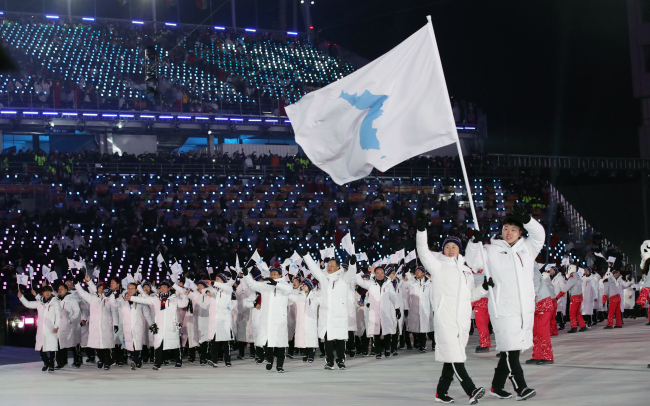North Korea on Tuesday announced it will not participate in the upcoming Tokyo Summer Olympics due to coronavirus concerns, thwarting Seoul’s hopes to use the games as an opportunity for rapprochement with the reclusive regime.
Pyongyang said the decision to skip the Olympics to be held on July 23 to Aug. 8 was to “protect athletes from the global health crisis caused by the malicious virus infection.” The decision was made when the North’s national Olympic committee met on March 25 in Pyongyang, according to the Sports in the Democratic People’s Republic of Korea, a government-run website.
This is the first time North Korea has missed a Summer Olympics since it boycotted the 1988 Olympics in Seoul during the Cold War.
Pyongyang’s dropping out from the game dampens the prospect for other countries to revive stalled ties with the communist nation. South Korean President Moon Jae-in, whose presidency ends next year, expressed hoped that the Olympics could provide an opportunity for dialogue with North Korea beyond sports, replicating similar success from the 2018 PyeongChang Winter Olympics, which set the stage for renewed relations between the US and North Korea, as well as between the two Koreas. Japanese Prime Minister Yoshihide Suga also shared intent to engage in talks with Pyongyang ahead of the Olympics to discuss a long-standing abduction issue between the two countries.
South Korea’s Unification Ministry, which is in charge of inter-Korean affairs, on Tuesday expressed “regret” over the North’s decision, as it hoped the forthcoming Olympics would be a chance to advance “peace on the Korean Peninsula and reconciliation and cooperation between the two Koreas.”
“Not only through the Tokyo Olympics or in areas of sports, the government will continue to find opportunities to foster dialogue and cooperation between the two Koreas,” a ministry official said.
South Korea’s Foreign Ministry expressed hope that the North will change its decision.
“As the Olympics is a festival of world peace and there is time left ahead, we hope that North will participate,” ministry spokesperson Choi Young-sam said in a press briefing.
North Korea’s participation in the Olympics in 2018 was a sudden about-face after a year of nuclear and missile tests by the communist nation that raised tensions on the peninsula. It was in PyeongChang that the two Koreas fielded a unified team for the first time in the Olympics history, in women’s ice hockey. The athletes from the South and the North also marched together under a blue map of the peninsula, representing a unified Korea, in the opening and closing ceremonies.
The game initiated detente between Pyongyang and the rest of the world, with the North’s high-ranking delegates to PyeongChang included Kim Yo-jong, North Korean leader Kim Jong-un’s powerful sister, who became the first member of the ruling Kim family to set foot in the South since the end of the Korean War 1950-53.
The Olympic truce eventually led to three historic inter-Korean summits between Moon and Kim, and also the Singapore summit between US President Donald Trump and Kim, which marked the first-ever meeting between the leaders of the US and North Korea. At the inter-Korean summit in September 2018, the two Koreas declared their intention to co-host the 2032 Summer Olympics.
But since the collapse of the Hanoi summit between Trump and Kim in February 2019, diplomatic efforts for denuclearization have been at a stalemate. The North recently fired two ballistic missiles, in an apparent warning to Washington as the Joe Biden administration is nearing completion of its policy review on Pyongyang.
Experts say the North’s decision to sit out from the game was expected amid Pyongyang’s strictest quarantine measures since the onset of the pandemic.
North Korea was one of the first countries to shut down its borders last year, and it has suspended all trade to prevent the spread of the coronavirus, though the country continues to claim it has had zero infections.
“From early on the chance of the North to participate in the Olympics was slim, as sending its athletes to Tokyo could put them at risk of infection. With North Korea’s lack of medical equipment and infrastructure and COVID-19 treatments, the cost of dispatching players to Tokyo is higher than the benefits it can earn from the attendance,” said Cheong Seong-chang, director of the Center for North Korean Studies at the Sejong Institute, adding Moon administration’s belief that the Olympics could be a breakthrough in inter-Korean relations and US-North Korea ties was unrealistic in the first place.
He added the decision is also a signal directed to both South Korea and the US that Pyongyang has no intention to resume dialogue anytime soon as the regime has warned lately, unless Washington withdraws its “hostile policy” toward the North.
By Ahn Sung-mi (
sahn@heraldcorp.com)








![[Today’s K-pop] Blackpink’s Jennie, Lisa invited to Coachella as solo acts](http://res.heraldm.com/phpwas/restmb_idxmake.php?idx=644&simg=/content/image/2024/11/21/20241121050099_0.jpg)